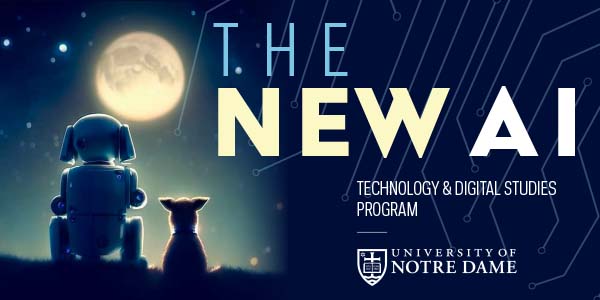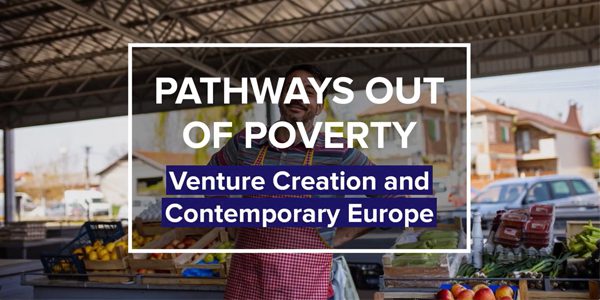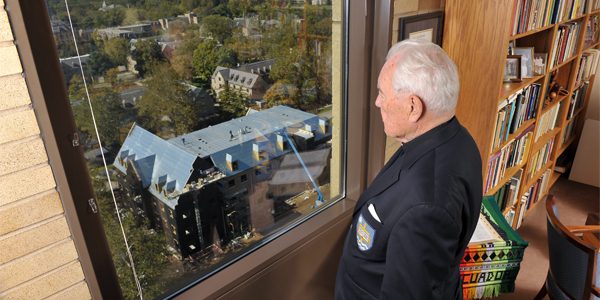Where We’re Going: The Global Citizen – Global Viewpoint
Subscribe to the ThinkND podcast on Apple, Spotify, or Google.
Featured Speakers:
- Brian Brisson ’85, former Minister Counselor for Commercial Affairs at U.S. Embassy in Mexico City
- Dr. David Gaus, Founder and CEO of Andean Health & Development
- Kagwiria Mbogori, former the Chairperson of the Kenya National Commission on Human Rights
- Ray Offenheiser, William J. Pulte Director and Professor of the Practice, Keough School of Global Affairs, University of Notre Dame
In the final session of Where We’re Going: The Global Citizen, moderator Ray Offenheiser welcomed three Notre Dame graduates currently living around the world to join in a discussion on what it means to be a global citizen. He started off introductions by describing his work at the Pulte Institute, which is an organization that hopes to be a catalyst for change on issues such as poverty, equality, and sustainability.
Listeners first met Brian Brisson, whose participation in the Kellogg School during his time at Notre Dame led him to Latin America, where he would end up serving at the U.S. Embassy in Mexico City for more than three decades. Brisson got to witness firsthand the globalization of Latin America, and noted that trade and business were the root of economic development in the region.
Next, Kagwiria Mbogori introduced herself, saying that her arrival at Notre Dame in 1996 felt remarkably like coming home. She studied international human rights law and after graduating, found that “the expertise [she] had gained from Notre Dame catapulted [her] into leadership in human rights issues in [her] country.”
Lastly, David Gaus introduced himself as an accounting major from Mendoza, who seriously contemplated being a priest or fighter pilot before finding himself “interested in the role of the Catholic Church in Latin American culture.” With the help of Father Ted Hesburgh, Gaus went on to become a doctor and founded Andean Health & Development in Latin America, from which would stem many impactful partnerships and interactions.
Offenheiser then asked Mbogori to speak more about her work in Africa, to which she responded by talking about her time working on the commission of jurists in Kenya and with the United Nations on behalf of Liberia. Her greatest insight was that in the context of conflict in which she worked, “everything is urgent and human suffering is unparalleled.” Brisson acknowledged this and added the encouragement that the march towards advancement was steady. Lending his view from Latin America, he was hopeful about the combination of technology and the innovative work that has started developing in the region. Gaus agreed with this potential, noting how the “industrial revolution and globalization have, in a way, homogenized the human experience.”
Gaus did admit concern, however, that so much of the power and control of technology was held by markets and governments. Brisson’s opinion was that corruption can easily lead to a lack of trust in an establishment that was meant to benefit the citizens. Mbogori’s concerns related to the lack of leadership in institutions during the coronavirus pandemic — the poverty index and domestic problems were increasing at an alarming rate.
Taking time to answer some questions from the audience, Offenheiser asked his guests to give advice on planning careers in sustainable development. Gaus began, testifying that uncertainty should be embraced and that once you find a passion, you should take a calculated leap of faith into making that your career. Offenheiser followed up that he often finds that “those who are in mission-based organizations end up feeling like they have chosen a vocation as much as they have chosen a career.” Mbogori emphasized the importance of choosing to serve based on something deeper — service to God or to fellow man.
The last question discussed migration from the perspective of a global citizen. Mbogori commented that the biggest reason for leaving one’s country seems to be the economy. Unfortunately, she continued, migrant labor proves the lack of ethics that tends to surround accepting immigrants into a foreign country. Similarly, Brisson acknowledged the big part that “migration on balance” plays in globalization. He shared his hopes that, especially for Americans, immigration could go back to having a positive connotation. After all, being a global citizen includes recognizing the interdependency all humans share.
- Developing countries are in need of institutions that protect the rights of citizens, very similar to entities that we sometimes take for granted.
- Innovation in Latin America is proof of growth in the region; however, there is still work to be done, especially in distributing the wealth to a broader range of people.
- The coronavirus pandemic threatens many developing countries into regressing in many areas that have been worked on to uphold the dignity of the human person.
- The United States should ideally stay engaged in developing regions, but where governments fall short, organizations such as Notre Dame can make a great impact in terms of connecting people globally.
- In understanding the interdependence that comes along with globalization, migration needs to be understood as an area where human dignity can be further upheld, rather than viewed as a burden.
- “Being a global citizen isn’t really a choice … you’re a part of the process.” — Brian Brisson, 10:47
- “Human rights work is courageous work, and a lot of institutions we take for granted that protect our rights are ones that are desperately in need of being put in place by many of these countries.” — Ray Offenheiser, 27:15
- “The Industrial Revolution and globalization have, in a way, homogenized the human experience.” — David Gaus, 32:08
- “In light of COVID … I’m looking at the regression of the great gains that had already been made toward achieving sustainable development goals.” — Kagwiria Mbogori, 34:51
- “Corruption erodes people’s confidence in institutions, and it sucks money out of the system that was meant for the benefit of citizens.” — Brian Brisson, 39:24
Related Content
The Future of Work
November 30, 2023 marks one year into the ChatGPT era and one of the most pressing concerns we hear from all quarters is: How will this affect the future of work and what the...
View EventPathways Out of Poverty
The question of entrepreneurship as part of the solution to global poverty is receiving increasing attention from scholars, economic development professionals, government...
watch videoFr. Ted Said…Serving Others: Tom Purekal ’98
Notre Dame has a long and strong tradition of service and being a force for good. Fr. Hesburgh’s commitment to serving others was the seed that grew into impactful service...
watch video


